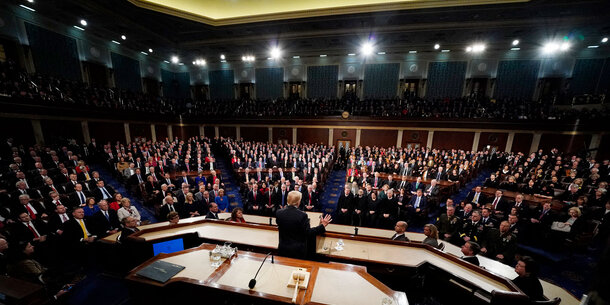This was originally published by Slate’s Future Tense.
Since March, Congress has held at least 10 hearings about A.I. across eight different committees or subcommittees. The Senate Judiciary Committee grilled the CEO of OpenAI, the Senate Armed Services Committee explored A.I. and defense, and the House Science Committee wanted to know about the latest A.I. innovations. In other words, it’s been a bit of a mess—largely because, unlike agriculture, financial services, and other crucial areas of American life, technology doesn’t have a committee dedicated solely to its regulation. Even committees like the House Committee on Science, Space, and Technology or the Senate Judiciary’s Subcommittee on Privacy, Technology, and the Law do not have exclusive jurisdiction over tech. As a result, several different committees are throwing spaghetti against the wall in a real-time demonstration that Congress is simply not structured or resourced to do its job on A.I., or the other technologies that are shaping its constituents’ lives.
Committees enable members of Congress to investigate an issue, hold hearings, and develop legislation, creating a base of knowledge that deepens over time. This structure allows the committee members—with the help of expert committee staff—to give sustained attention to an issue. All bills must pass through committee before they make it to the Senate or House floor for a vote, and while we’re all familiar with the flashy hearings we see on television, there’s a lot of everyday, behind-the-scenes work that happens in committees to move the legislative process along. Every session, committees hold countless hearings, markups, and briefings that allow members to learn about policy, deliberate, and identify partners.
Committee structure and process have evolved over time, but the last time Congress reorganized committee jurisdictions was in the 1970s, before the internet existed. At the time, Congress decided it was due for some self-reinvention to meet the country’s changing needs, and passed the 1970 Legislative Reorganization Act. The act led to the creation of new committees like the Senate Committee on Veterans’ Affairs. This reorganization was important because without a dedicated committee on a topic, things can get lost between jurisdictional cracks, and it’s much harder to achieve results.
That could happen with A.I. The alarm bells sounding over A.I., including its misuse to spread misinformation or for other nefarious and discriminatory purposes, all point to the need for comprehensive federal regulation. Watermarks for A.I., increased disclosure requirements, and mandated safety tests are just a few of the many options for regulation. But instead of mounting a concerted effort, different committees have held hearings on distinct facets of the issue.
In addition to lacking a committee devoted to technology, Congress does not employ enough staff who are experts in tech policy (let alone the latest developments in A.I.) and who can advise the members who don’t have that knowledge. Indeed, Congress doesn’t employ enough staff, period. The House and Senate have several thousand fewer staff than in the 1980s, and only a handful have advanced degrees, let alone science or tech expertise. This includes both personal staff, who support individual members, and committee staff, who support committees and are hired by the chair or ranking member. For instance, House Science, Space, and Technology Committee staff declined by nearly 45 percent between 1994 and 2016. Hiring caps and salary caps, insufficient funding, and a hiring pipeline that does not proactively seek out scientific and technical expertise are all to blame.
The dearth of internal infrastructure cramps Congress’ access to external experts. When inviting witnesses to testify in hearings, committee staff frequently rely on insular groups of experts they already know, many of whom live and work in D.C. To be sure, this dynamic shapes witness selection in all committees. But on a topic like A.I., which has disparate impacts on different communities, it’s particularly important for Congress to hear from a broader swath of experts and people with lived experiences. Lobbyists are also enmeshed in the process and are likely to know committee staff, and often suggest witnesses who suit their clients’ purposes. Inexperienced staff are also more likely to be manipulated by lobbyists, as they may not have as much expertise in niche tech topics, thus limiting the flow of external information into Congress.
One clear solution is to create a dedicated technology committee in each chamber that is staffed by tech experts. A dedicated technology committee could channel the tremendous energy swirling around A.I. into a series of connected hearings and legislative efforts, thanks to the assistance of expert staff. Just as the agriculture committee has broad jurisdiction of that sector of the economy, a tech committee could focus on issues including A.I., social media, broadband access, and content moderation, among others.
This sounds straightforward on paper. Each chamber can pass resolutions to create new committees. The sticking point, however, is that reallocating committee jurisdictions means reallocating power, and existing committees might be resistant. Bolstering congressional expertise in this way would also reduce the power of lobbyists, because staff would not be as reliant on them for information and witness suggestions—which would inevitably present another hurdle. To surmount these obstacles, we’ll need to harness political will and a sense of urgency.
As a smaller step, Congress can build up existing congressional support agencies like the Government Accountability Office’s Science Technology Assessment and Analytics division, or STAA, which helps Congress understand emerging issues in science and technology. STAA has written several reports on different applications and potential dangers of A.I. In a Congress that struggles with insufficient personal and committee staff, congressional support agencies like the GAO represent an important educational resource that members and staff frequently seek out. Though these are invaluable resources, they are not enough. An understaffed Congress that tends toward a familiar pool of witnesses needs continuous access to a wide range of experts and stakeholders.
The GAO could help existing committees and staff further by creating and maintaining a network of experts who can speak to the various aspects of A.I. Many parliaments are already taking similar measures. For example, the British Parliament has a database of more than 15,000 organizations that committees can call on when exploring certain areas, and a dedicated public engagement team within the Parliament uses the database to help committees find witnesses. Legislatures around the world—including in Australia, Brazil, Canada, and Indonesia—are also creating dedicated technology committees with clear jurisdiction over the technology sector. Congress can follow suit.
The challenge of regulating social media—which Congress largely dropped the ball on—presents a cautionary tale. There is widespread agreement that Congress has to act now to regulate A.I., but it can’t quite figure out how. Dedicated technology committees could help with that.



